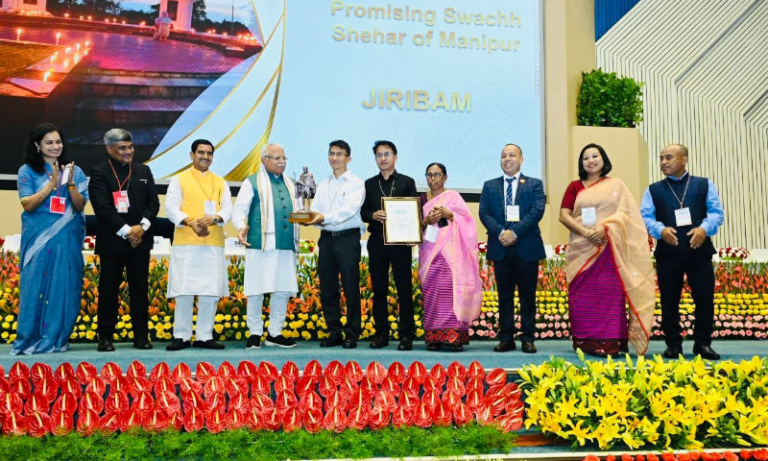Manipur Actor Accuses ‘Jigra’ Team of Unprofessionalism: A Deep Dive into Discriminatory Experiences in the Film Industry
Summary of the News Article
A Manipur-based actor has publicly accused the production team of the Bollywood film Jigra of unprofessionalism and discrimination. The actor claimed to have experienced discriminatory treatment during their involvement in the project, highlighting deeper issues of marginalization faced by individuals from northeastern India in mainstream Bollywood. The accusations have sparked significant conversation around the lack of inclusivity and respect within the film industry, prompting calls for more equitable representation and fair treatment of regional actors.
A Closer Look at Discrimination in Bollywood: Manipur Actor’s Accusations Against Jigra Team
1. The Allegations: What Went Wrong?
In recent news, an actor from Manipur has shed light on an unfortunate experience while working on the set of Jigra, a Bollywood movie. They accused the production team of unprofessional conduct and discrimination, which is both shocking and disappointing. Can you imagine being part of a project, only to feel sidelined and disrespected because of where you’re from? It’s like being invited to a party, but no one really wants you there.
This incident highlights not just an individual case but an underlying issue many regional actors face in Bollywood—marginalization and exclusion. The actor claims that the treatment they received was vastly different from that of others, and their concerns were brushed aside, making it clear that their presence was not truly valued.
2. Discrimination in the Film Industry: A Persistent Problem
While the film industry has made strides in addressing various social issues on screen, the off-screen reality often tells a different story. Discrimination based on region, appearance, and language continues to plague Bollywood. For actors from northeastern India, this is a recurring challenge. Many actors from the region have voiced similar experiences, where they are either typecast into stereotypical roles or treated as outsiders within the industry.
This particular accusation against the Jigra team is not an isolated case but a reflection of a larger issue within Bollywood. It’s like putting on a façade of progressiveness in films but failing to embody the same values in everyday interactions.
3. What Does Unprofessionalism in the Industry Look Like?
When we talk about unprofessional behavior, it can take many forms. In the case of the Jigra team, the accused behavior allegedly ranged from dismissiveness to outright discriminatory practices. The Manipur actor mentioned that they were treated as an afterthought, with their concerns being largely ignored and their presence barely acknowledged.
In any professional setting, let alone in a creative industry like film, such treatment can be disheartening and frustrating. It’s akin to being part of a team but never having your voice heard or valued. For regional actors, these challenges are compounded by preconceived notions and stereotypes that make it harder for them to break into the mainstream.
4. Northeastern Representation in Bollywood: A Long-standing Battle
The experience of the Manipur actor is a stark reminder of the broader struggles faced by actors from northeastern India. Bollywood, often seen as the epitome of Indian cinema, has historically been dominated by actors from certain regions, leaving little room for those from the northeast. It’s a bit like trying to fit into a club that’s made it clear you don’t quite belong.
There have been countless stories of actors from the northeast being typecast into specific roles, usually ones that are caricatures of their cultural identities. For instance, they might be cast as the ‘exotic’ character in a movie, without any real depth or respect given to their heritage. The lack of diverse and nuanced roles further perpetuates the sense of exclusion, making it difficult for actors from these regions to thrive in the industry.
5. The Importance of Inclusivity in Cinema
Why is this conversation so important? Because cinema is one of the most influential mediums in shaping societal attitudes. When an entire region is underrepresented or misrepresented on screen, it perpetuates ignorance and reinforces stereotypes. The accusation against the Jigra team brings to the forefront the need for a more inclusive and respectful approach in Bollywood, not just in terms of casting but also in the treatment of its talent.
Inclusivity isn’t just a buzzword; it’s about ensuring that every actor, regardless of where they’re from, has equal opportunities and is treated with respect. Imagine watching a movie that claims to promote unity and diversity, but behind the scenes, the people involved are being marginalized. It’s a contradiction that undermines the very message cinema is meant to convey.
6. Moving Beyond Tokenism: A Call for Real Change
Tokenism in the industry is another issue that cannot be ignored. Sometimes, films will include actors from the northeast or other underrepresented communities, but only in minor roles that don’t do justice to their talent. This type of casting is more about ticking diversity boxes than genuinely appreciating their contributions.
The Manipur actor’s experience on the set of Jigra serves as a wake-up call for Bollywood to move beyond tokenism. It’s about creating an environment where all actors feel valued and respected, not just as pawns in a diversity game but as integral parts of the storytelling process.
7. Why This Incident Resonates with Many
The accusations against the Jigra team have struck a chord with many because they represent a larger problem within Indian society—regional discrimination. Northeast India, in particular, has long been the subject of ignorance and stereotyping. Despite being an integral part of the country, its people are often seen as ‘different,’ and this mindset permeates into industries like Bollywood.
For regional actors, breaking into the mainstream isn’t just about talent; it’s about overcoming deeply ingrained biases. The Manipur actor’s brave decision to speak out against discrimination resonates with many who have faced similar challenges but may not have had the platform to voice their concerns.
8. The Road Ahead: How Can Bollywood Improve?
So, where do we go from here? The accusations against the Jigra team should serve as a catalyst for change in Bollywood. Here are a few ways the industry can improve:
- Fostering Inclusivity: The industry must create an inclusive environment where actors from all regions feel respected and valued. This means not only offering them roles but also treating them with dignity on set.
- Casting Diversity: Casting should reflect the diversity of India. The northeast is rich in talent, and it’s time for Bollywood to tap into this pool more authentically, without resorting to stereotypes.
- Equal Opportunities: Regional actors should have equal opportunities to audition for roles, regardless of where they’re from. This would not only increase representation but also bring fresh talent into the industry.
- Raising Awareness: There needs to be more awareness about the rich cultural diversity of India, particularly the northeastern states. This can be done through cinema that accurately portrays the lives, struggles, and triumphs of people from this region.
9. Conclusion: A Call for Change in the Industry
The incident involving the Manipur actor and the Jigra team is a reflection of a much larger issue in Bollywood and Indian society at large. Discrimination, whether based on region, race, or appearance, has no place in any industry, especially one as influential as cinema. For Bollywood to truly become a global powerhouse, it must embrace and celebrate the diversity of its own country.
The film industry has a responsibility to not only entertain but also to inspire and educate. By fostering an inclusive and respectful environment for all actors, Bollywood can lead the way in promoting unity and breaking down barriers. The road ahead may be long, but every step toward inclusivity is a step in the right direction.
FAQs
- What were the allegations made by the Manipur actor against the Jigra team? The actor accused the Jigra team of unprofessionalism and discrimination, stating that they were treated differently from other cast members.
- Why is representation of northeastern actors in Bollywood important? Representation is crucial because it ensures that the diverse cultures and experiences of all regions of India, including the northeast, are accurately portrayed in mainstream media.
- What is tokenism in the film industry? Tokenism refers to the superficial inclusion of actors from underrepresented groups without giving them meaningful roles or recognizing their true talent.
- How can Bollywood improve inclusivity for regional actors? Bollywood can improve inclusivity by offering more diverse roles, treating all actors with respect, and fostering an environment that values talent over regional backgrounds.
- What impact does regional discrimination have on actors from the northeast? Regional discrimination limits opportunities for northeastern actors, often typecasting them into stereotypical roles and preventing them from gaining mainstream recognition.


Then , why are you so much of after it.